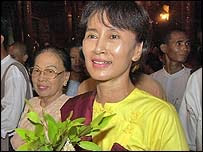Aung San Suu Kyi
Lintner, Bertil; Outrage:Burma's Struggle for Democracy, White Lotus, 1990.
Aung San Suu Kyi, a Noble Peace Laureate of 1991, was cited by the Nobel Committee as "one of the most extraordinary examples of civil courage in Asia in recent decades." She was educated at Delhi University and Oxford University. She has won numerous awards and honors in addition to the Nobel Peace Prize, most notably the Rafto Human Rights Prize and the Sakhorov Prize. She is the general secretary and leader of Burma's National League for Democracy and was placed under house arrest by the military junta in July of 1989 for her activities.
small image
Influenced by the legacy of her father, Aung San Suu Kyi began her public support of her country's struggle for democracy and human rights on August 26, 1988.
Aung San Suu Kyi traveled extensively throughout the country, giving hundreds of speeches often to crowds of thousands, in an attempt to unite the people and reinstill their courage in achieving their long-sought goal of freedom. She was loved and revered by the Burmese people in their's country's time of darkness.
In courageous defiance of the military edict forbidding gatherings of more than four, people turned out in mass to listen to Aung San Suu Kyi wherever she spoke.
As Aung San Suu Kyi gained in popularity, military harassment of her campaign esclated. Here, she is trailed by an armed government solider.
Shortly before her house arrest in July 1989, Aung San Suu Kyi spoke out on behalf of all the ethnic minorities and the principles of democracy.
Within a system which denies the existence of basic human rights, fear tends to be the order of the day...A most insidious form of fear is that which masquerades as common sense or even wisdom, condemning as foolish, reckless, insignficant, or futile the small, daily acts of courage which help to preserve man's self-respect and inherent human dignity.
-Aung San Suu Kyi
Aung San Suu Kyi wrote numerous essays in her Rangoon home during Burma's upheaval in the final months of 1988.
In May 1992, the SLORC allowed Dr. Miachael Aris, Aung San Suu Kyi's husband, and her two sons to visit her for the first time in almost three years.
While in detention, Aung San Suu Kyi was visited by her two sons, Alexander (left) and Kim (right) in May 1993.
Aung San Suu Kyi with her British husband, Michael Aris, in 1973.
Friday, August 3, 2007
Aung San Suu Kyi
Posted by Ko Myint Maung at Friday, August 03, 2007
Subscribe to:
Post Comments (Atom)



![ko aung san[1].sutdent"s union](http://4.bp.blogspot.com/_a0nfpjJrE5M/RsqTYaF216I/AAAAAAAAAIY/SxCMvs6FM5U/S228/ko+aung+san%5B1%5D.sutdent%27s+union+chair.jpg)














.jpg)






No comments:
Post a Comment